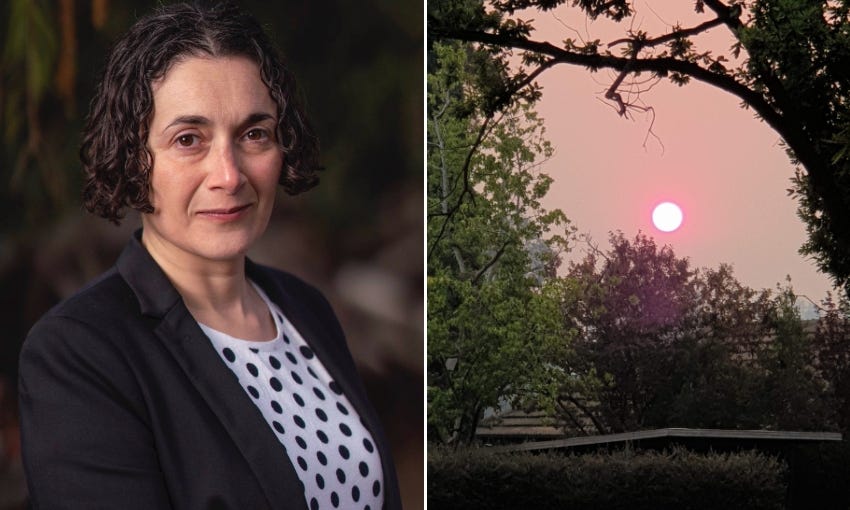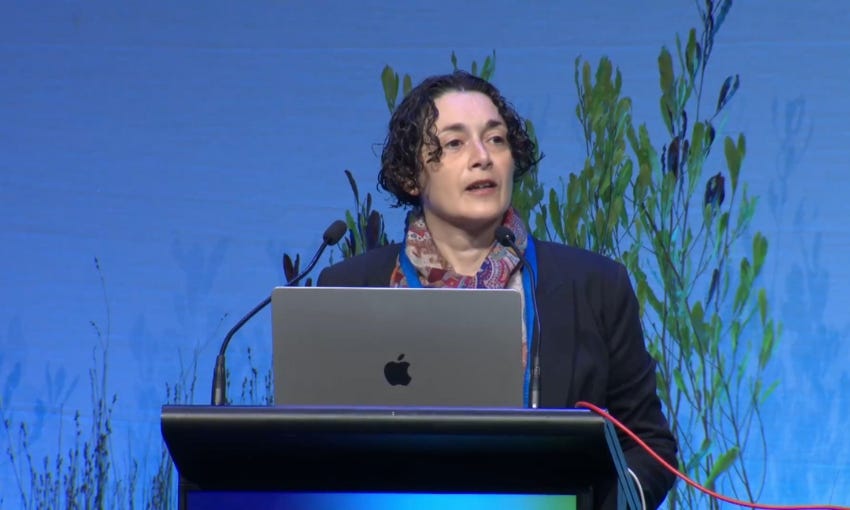What one climate scientist wants everyone to know
‘The fight for a habitable planet is on right now, and we need everyone to show up.’
Kia ora! Welcome to Future Proof. Thanks for joining me. First, a quick note: Future Proof is shifting to a fortnightly schedule, so look out for me in your inbox every two weeks from now on.
In this edition: a cycle lane mystery and speedy kiwi. But first: a scientific reality check from a climate scientist.
Left: climate scientist Joëlle Gergis. Right: the view from my flat in Canberra as a cloud of bushfire smoke descended on the city in late 2019.
In the summer of 2019, an acrid fug of smoke cloaked the city of Canberra, where I was living at the time. The heat was oppressive – pushing 40 °C – and a bushfire haze turned the sun into an angry red orb. I tried not to leave my air-conditioned office: the air outside was choked with specks of incinerated eucalypt. I googled where I could buy an air pollution mask.
It was the beginning of the Black Summer, when catastrophic bushfires raged through 243,000 square kilometres of Australia. That’s a mind-boggling number equivalent to 90% of New Zealand’s landmass. Infernos killed 34 people and an estimated three billion animals. The iconic koala was pushed onto the endangered species list.
“I never imagined I'd live to see the day when the koala has the potential to become extinct in our country,” says Joëlle Gergis, an Australian climate scientist.
Gergis, too, was in Canberra that Black Summer. She was deep in the throes of writing for the Intergovernmental Panel on Climate Change (IPCC) 6th assessment report – a comprehensive synthesis of everything we know about the science of climate change.
“These things we were writing about in the report were literally happening outside my window,” she says. A lot of scientists, people just like her, assumed that the big, meaty reports, the science, would speak for itself. But this was a wake-up call: “In fact, no, it doesn't speak for itself. And unless you get out there and say something, people will fill the gap.” Gergis wanted to tell the true, scientific climate story and help everyone connect the dots.
The scientific reality
In an impassioned address at the Climate Change and Business Conference on Monday, she laid bare the scientific reality we’re experiencing – not just what’s coming 20, 30 years down the track, but what’s happening now.
The record-breaking heat of 2023, both on land and in the oceans, that’s likely to be surpassed again in 2024. The 2022 coral bleaching that dealt the “death blow” to the Great Barrier Reef. The signs of abrupt change in Antarctica, where the melting of the West Antarctic ice sheet could raise sea levels by four metres, shift ocean circulation, and fundamentally alter global weather patterns.
“I just can't believe that we are going to literally destabilise the Earth's climate and, yet, we are making excuses, trying to rationalise the use of fossil fuels,” Gergis tells me.
About 80% of the excess carbon in the atmosphere has come from us burning fossil fuels, she points out. The rest comes from the destruction of carbon-storing ecosystems like wetlands and forests. “No matter which way you want to look at it, it's the burning of coal, oil and gas that’s really cooking the planet,” she says.
About half of all of that planet-heating carbon accumulating in the atmosphere has been pumped out since 1990 – the year the very first IPCC report was released.
Joëlle Gergis speaks at the 2024 Climate Change and Business Conference in Auckland.
‘Policy failure of colossal proportions’
Having studied, taught and researched climate change for close to 30 years, Gergis thought we’d be just a bit closer to an adequate political response to this existential threat. Instead, she describes what we have as “a policy failure of colossal proportions”.
At the Cop28 climate summit last year, a “global stocktake” assessed where we’re at collectively with our global climate goals. It was sobering: the world is on track to reduce emissions by 2%, not the 43% we need by 2030 to limit warming to as close to 1.5°C as possible.
Instead of effective policies, decision-makers have been reeled in by fossil fuel talking points. Gergis is scathing of Australia’s approach to using gas as a “transition fuel”, likening switching from coal to gas to swapping cigarettes for vapes. New Zealand’s imminent reversal of its oil and gas exploration ban is “a step backwards” too: “It’s clear that Australia’s lack of genuine leadership on climate change is influencing New Zealand’s energy policy and encouraging us to turn our back on our Pacific Island neighbours,” she told the conference audience.
And we can’t rely on as-yet-unproven carbon capture tech, either. Currently deployed carbon capture technology – which sucks carbon out of the atmosphere and stores it – can only offset about 0.01% of global emissions. Gergis labels it “a reckless gamble with our planet’s future” – especially when safe alternatives already exist.
“We could actually reduce global emissions between 50 to 80% by 2030 with existing technology. So we don't actually need to wait for anything to materialise. We can do it right now,” she says.
Rage and hope in the age of consequences
In 2022, Gergis published a book called Humanity’s Moment: A climate scientist’s case for hope. The “hope” subtitle is “a little bit funny if you know me really well,” she says. (Her recent essay, Highway to hell, might seem more on-brand.) But Gergis is adamant that hope is essential, an active choice we should all make in the face of this confronting reality.
You can give yourself permission to feel emotional about climate change too. Gergis says she’s been “getting in touch with her rage”. Likewise, despair is an appropriate emotional response to “very distressing information.” But we can’t leave ourselves wallowing in doom.
“We need to use that despair, that care for the planet, as our fuel for rage and anger and action. This is not the age of apathy. This is the age of consequences. We will look back at the 2020s and say, ‘Well, where were you? What did you do? How did you show up?’
“The fight for a habitable planet is on right now, and we need everyone to show up.”
Can you believe it, The Spinoff is 10 years old!
We are celebrating all week on The Spinoff with special content and prizes. Don’t miss your opportunity to rank our rankings and get in the draw to win a mega hamper of goods ranked by The Spinoff. If you’re a Spinoff member you can get an extra entry into the draw by playing our birthday week treasure hunt. Find out more here.
You’re not meant to ask for presents, but if you’re not a member now would be a great time to gift us your support. We cannot overstate how vital support from our readers is, especially as we navigate uncertainty and look at the next ten years of telling Aotearoa stories.
Thanks for being part of our story, we wouldn’t have made it to this mighty milestone without you.
A cycle lane whodunnit
The transport plan announced last week halved funding for cycling and walking, and focuses instead on roads. Bernard Hickey’s analysis of the decision on The Kākā is worth reading, while Timothy Welch of the University of Auckland offers a withering assessment of the plan: “...it’s a deliberate U-turn away from the sustainable, efficient urban transport systems the cities need. Rather than investing in New Zealanders having a genuine choice in how they move in the future, it shackles them to a car-dependent past,” he writes on The Conversation.
Meanwhile, bike lanes have been accused of causing a spate of business closures across the capital. The Spinoff’s Wellington editor Joel McManus goes in search of the evidence, and finds something much more troubling. Tears in the space-time continuum, actual stats on cycling – this mystery has it all. Must read.
An electrifying plan for Aotearoa
A couple of weeks ago Future Proof covered a new report all about switching to electric, and the cost and emissions savings that could generate. On When the Facts Change, Bernard Hickey sits down with the report’s lead author, Dr Saul Griffith, to talk about Aotearoa’s great electrification opportunity.
More stories
UK band Massive Attack have partnered with a climate scientist to develop a roadmap for lower carbon concerts. (Nature)
Air NZ, Mitre 10 score lowest among 21 big New Zealand companies assessed on their climate targets. (RNZ)
An ancient African grain, fonio, is drought resistant and grows fast in poor soil. A collective of brewers is investigating its craft beer potential. (The Washington Post)
Planes powered by poo: Will sustainable aviation fuel take off? (BBC)
More than 30,000 people gathered in South Korea’s capital over the weekend, protesting a lack of climate progress. (Reuters)
Reducing “overconsumption” of meat and dairy could cut 17% of global food emissions every year. (Carbon Brief)
Solar power is shattering global records. (Canary Media)
To finish this edition, the kiwi are back. Check out the unexpected trail runner this mountain biker came across on Mākara Peak in Wellington last Thursday. Kiwi might not fly, but they sure can go like lightning: Capital Kiwi says they can reach top speeds of more than 20 km/h. Up north, another unexpected kiwi: this one was found by a resident of Russell, exploring their shower cubicle. The curious young’un had got in through the cat door.
I, for one, welcome our new flightless overlords,
Ellen
Future Proof is looking for a sponsor!
Connect your brand with an insightful exploration of environmental news, reaching influential readers committed to sustainability and staying informed about the state of our natural world. Contact commercial@thespinoff.co.nz to learn more.
Got some feedback about Future Proof or topics you’d like covered? Get in touch with me at futureproof@thespinoff.co.nz
















